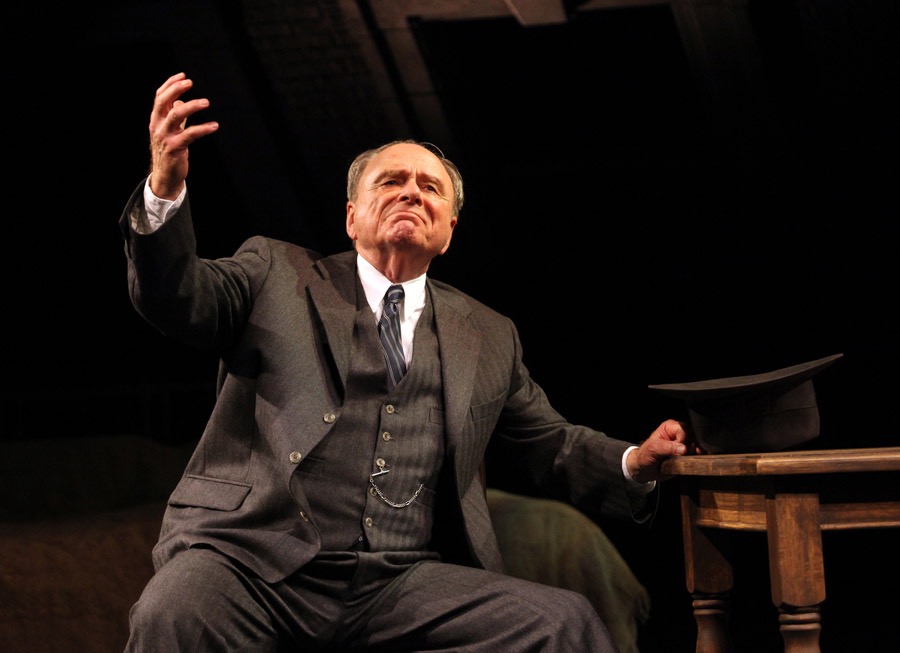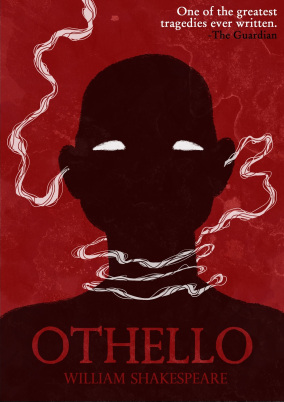‘At the heart of the tragic experience is an overwhelming sense of shame’.
To what extent do you agree with this view in the relation to the two texts you have studied? Remember to include in your answer relevant comment on the ways writers have shaped meanings.
Whilst it can be said that shame, as experienced by the protagonists in ‘Death of a Salesman’ and Keats’ poetry (and readers and audiences) is significant, to what extent it is overwhelming and at the heart of the tragic experience may be debated.
Primarily, Miller explores the theme of shame through Willy’s relationship with Biff and their continual conflict. Within Act One, Willy expresses his anger and shame towards his son through the use of the adjectives ‘lazy’ and ‘moody’, which directs the reader’s attention to Biff’s lack of success and drive that is needed to attain the American Dream. This, in turn, casts the attention off Willy’s own personal failures, caused by the chaos and destruction of his ‘massive dreams’ in his own mind. Here, Biff’s fatal flaw is underscored: he strives for greatness yet at the first sign of hardship he gives up. It could be argued that this is due to his personal conflict between wanting to be surrounded by natural life and following in his father’s footsteps of being ‘well-liked’ in the world of business and capitalism. Biff’s habit to ‘borrow’ items foregrounds his future failures, which causes Willy great shame, as in fear of not succeeding he sabotages himself to prevent rejection. Each item he steals, such as the basketball and pen, becomes a motif of his cyclical life as he moves from one opportunity to another, stuck in ‘a measly manner of existence’. However, it could be argued that Willy’s feelings of shame towards Biff are a result of his own insecurities of being unable to maintain the vision of the American Dream. He is so blinkered by the societal construct that he elevates the goal of hard work leading to success; so much so that he is unable to see the love and support that surrounds him. For example, in Act Two, Willy asks Charley for ‘a hundred and ten dollars’ but refuses Charley’s job offer. Here, Willy’s pride gets the better of him as he would prefer to fulfil his dream of being like Dave Singleman, a salesman who ‘died the death of a salesman, in his green velvet slippers’, rather than acknowledge the support from Charley and take the job. The two adjectives ‘green’ and ‘velvet’ create a sense of luxury to act as a reminder of the increase of consumerism between 1945 and 1949 in America. In comparison, Willy’s life is a shameful one, as only a few people attend his funeral compared to the ‘hundreds of salesmans and buyers’ at Singleman’s. Therefore, Willy’s own poor mental state is reflected in the shame he feels towards Biff when he claims ‘not finding yourself at the age of thirty-four is a disgrace’. This is ironic as, even in death, Willy Loman has not found himself due to him having the ‘wrong dreams’ and ‘never [knowing] who he was’.
A similar sense of shame may be seen at the heart of the Knight’s tragic experience in ‘La Belle Dame Sans Merci’. The Knight’s tragic experience and the shame the reader feels for him may begin when he places himself in a world he does not belong. This can be seen as he ‘made a garland for her head.’ The inevitability of his limbic state at the end is highlighted here as he tries to place himself into a superior position of a potent being. Furthermore, another moment of shame can be seen as he ‘shut her wild wild eyes.’ Through this, shame is presented as he tries to dominate a superior force, highlighting the anthropocentrism of humanity. The use of the adjective ‘wild’ shows the futility of his own actions and heightens the shame the listener feels. Additionally, the Knight fails to see the futility of his own actions which presents shame within itself. This is underscored as he ‘sojourns’ ‘on the cold hillside’, he has self-willed his own isolation and his desolation is down to his inability to maintain the vision. The more we attempt to vision beauty the more painful the world seems due to its insufficiencies. Keats may have done this to create an extended metaphor for the struggles he experienced in his endeavours to capture the true beauty of reality and dreams and to show the power the natural world holds. As well as his discontent with the Industrial Revolution. A reader may experience shame towards the Knight and his selfish acts for pointless reasons.
Moreover, in “Death of a Salesman”, Arthur Miller portrays shame in his play – especially through the characterisation of Willy and Biff Loman. This is demonstrated when willy said “What are you trying to do, blame it on me? If a boy lays down is that my fault?”. This suggests how Willy is trying to pass away his guilt by not taking any responsibility over his sons’ actions and deflects any attention away from their father and son relationship. The use of rhetorical questions suggest how Willy takes no ownership for his sons’ failures and does not support Biff in a parental way but knocks him down like another member of everyday society. However, from Biff discovering the truth about Willy’s affair, the division in their relationship becomes evidently clear. The shame and guilt that Willy feels from this causes a natural drift in their relationship and the shame overpowers any bond that the father and son had prior to this event taking place. Once Biff discovers the reality of Willy’s double-life, a heated debate takes place after Willy tells Biff, “I gave you an order! Biff, come back here or I will beat you!”. The use of violent language shows the turning point in their relationship and is the guilt-trigger that causes it to degrade; Miller uses this line to draw attention to the shame that Willy experiences as well as his feelings of fear.
In a similar way, it could be argued that both Lycius and Lamia’s sense of shame overwhelm Keats’ tragic story. For example Lycius, who is originally characterised as ‘gentle’, a metaphor for ‘the poet’ immersed in the creative imagination, becomes disillusioned with his love for Lamia. Here Lycius begins to revel in the patriarchy and ultimately becomes a hyper masculine figure, antithetic to the man he was before. We can see this through his treatment of Lamia when he not only begins to adhere to gender stereotypes by upholding a domineering persona over her, before his lack of recognition towards her at their wedding ceremony yet displaying her to their ‘herd’ of guests like a ‘trophy’. This heightens an elements of shame towards the end as, not only is he still wilfully ignorant to her true form, in order to maintain a more idealistic illusion, Lycius’ myopia towards his one tragic transformation could be perceived as shameful from a reader’s perspective as he is so blinkered to the man he had now; ‘blinded Lycius’. On the contrary, one could also argue that there is a great amount of shame in Lamia’s transformation from a potent, ‘palpitating’ Goddess to a ‘real woman’; subservient to get male counterpart – illustrated by how ‘she nothing said’- implying she is trapped in the domestic sphere. This may evoke disappointment for a feminist reader, regarding the shameful diminishing Lycius exerts upon her, on-top of how here newfound stature in the mortal world requires her to submit herself to the patriarchy, and she sadly does so passively. Yet optimistically, her tragic demise could be interpreted as her empowering liberaration, as it allows her to escape – which Keats so craved- and be free from a world that did not accept her sovereignty and femme fatale force.
Predominantly, the ‘money bag’ brothers in ‘Isabella…’ epitomize the embodiment of capitalistic views in the way that they exploit ‘tortured minds’ in ‘noisy factories’. Their Florentine origins may be a factor contributing to their anthropocentric stance as they are a product of their environment. ‘these men of cruel day’ succumb to toxic masculinity and the pressures of societal norms. To uphold their reputation, they flee their guilt which acts as a barrier to the reality of abandoning their sister. This act of folly illustrates the underlying shame and deflection of their emotions. Therefore, shame does act as an overwhelming internal conflict that completely consumes ‘the brethren’, as they feel remorseful towards Isabella. However, their shame is halted in regards to the disposable ‘Lorenzo!’ through his working-class status.
On the other hand, it could equally be argued that it is not shame but Willy’s shameless behaviour that is the primary catalyst for the tragic events of Death of a Salesman. Throughout Miller’s play, Willy participates in a number of hypocrisies and immoral activities, concerned not with the morality of the actions themselves but the risks and consequences of being caught. One such example of this is the affair that Willy has in Boston with the nameless “woman”, as it demonstrably has a profound impact on Biff. Whilst Willy’s anger and outbursts towards Biff are ostensibly a coping mechanism for his failure to raise his “star” of a son effectively, it is the consequences of getting caught that inspired such feelings rather than regret towards the indecency of his actions. During his moment of analepsis in Frank’s Chop House, in which he reflects upon the affair, it is made clear that he is primarily concerned with any potential consequences of the affair to himself. Before engaging the extramarital affair, an act which both modern and contemporary audiences would largely view as wrong, Willy’s first thought is that there may be “a law in Massachusetts about” affairs, not the hurt that he might and ultimately does cause to his family. Therefore, in his lowest moment in the play, and in the moment that catalyses the play’s tragedy, it can be said that Willy was entirely shameless.
Equally, it might be questioned as to whether shame is truly at the heart of the tragic experience in ‘Isabella’. Here it is surely love that is overwhelming and that which brings about Isabella’s terrible grief. This can be portrayed in the initial passivity of their relationship when they ‘spake they to their pillows’. Furthermore, Lorenzo’s blinkeredness and inaction can be evidenced when ‘her full shape would all his seeing fill’. The fixation of their love contributed to the naivety and ignorance towards the societal dangers of their forbidden love. ‘The brethren’ saw ‘many signs’ which could indicate the futility and inevitability of the lover’s downfall, which Isabella and Lorenzo were blindly unaware of due to their myopic ‘sick longing’ for one another. Therefore, shame plays an important role of acting as a catalyst for the brothers attempt at fleeing. Despite this, love is the ultimate driving force for their societal subversion and the reason for their shame.
Although it can be said that an overwhelming sense of shame is at the heart of the tragic experiences in both ’Death of a Salesman’ and Keats’ stories, perhaps it is fairer to say that it just one element contributing to the sadness that audiences feel, with other factors such as a lack of shame and a fixation on love causing myopia at play.








